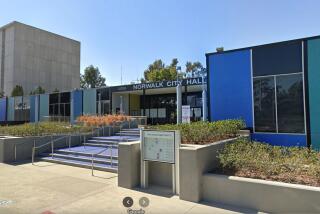Red Tape Keeping Church Shelter in a Bind : Homeless: The city has temporarily closed the facility. Officials say they warned operators about obtaining permits.
COMPTON — Most of the 85 homeless men, women and children who were turned out of a Compton church and shelter early this week by city officials scattered to other shelters, donated trailers and back to the streets.
But Pastor Charles Patrick set up a tent in the church parking lot and vowed to reunited his scattered flock.
“We’ve never turned anybody away before, and I’m not going to start now,” Patrick said.
Compton officials locked the doors of Patrick’s Sunago Christian Fellowship Church, located in an industrial park on Compton Boulevard, saying he failed to acquire the proper permits despite repeated warnings.
The church also housed the 175-bed Fragment House homeless shelter.
Frustrated code-enforcement officers visited the site three times in the last two months, each time telling the pastor that he was violating city laws, said John Johnson, Compton community planning and development coordinator.
On March 26, officials threatened to arrest everyone on the premises if the church and shelter were not cleared within three hours. Five minutes before the deadline, Patrick received a three-day extension.
“We want to work with these people,” Johnson said, “but in no case will we allow illegal businesses to exist.”
Eighty-five people stayed in Fragment House the last night it was open. Some of them went to a shelter in Long Beach, others to missions in Los Angeles. Others simply returned to the streets, Patrick said.
Among those who found shelter elsewhere was James Leater, 53, who was recently discharged from a hospital after surgery. He sat in the shelter parking lot, wearing a hospital gown over his pants Monday, waiting to be taken to the Tri-Care Center, a shelter in Long Beach.
Delilah Spurlock, 43, and her two children also had to look for a new place to stay and feared that they might have to return to living in their car. Spurlock said she worked as a nurse’s aide, custodian and food preparer before she lost her last job.
“I’ve worked all my life. Why doesn’t someone help me?” she asked.
By Monday, Patrick had the $1,200 permit-processing fee and a completed application but was told to leave the church until his request is processed. That will take six to eight weeks, officials said.
For Patrick and his wife, Gwen, the last four months have been a confusion of red tape and regulations.
Fragment House opened in December with a 60-day county contract to provide cold-weather housing for the homeless. Since the county contract expired, the shelter has survived primarily on donations, Patrick said.
Fragment House is the only homeless shelter in Compton that admits men as well as women. Of the city’s two other shelters, one is for women and the other for women and children.
The two-story industrial park building offered a place to sleep, two hot meals a day, and Bible study classes morning and night. The Patricks and about 25 volunteers also provided job counseling, clothing, money management courses and referrals to other agencies.
During the first three months of operation, Fragment House served 18,000 meals, and Charles Patrick made regular trips to City Hall to work out the required permit.
“It seemed like every time I went in there, they wanted something different,” Patrick said. “First they needed blueprints. I got those. Then they needed the deed to the property, then a lease agreement. They never asked for everything at the same time.”
Johnson said, however, that the instructions and requirements for a conditional-use permit are clearly stated in a packet of information the Patricks received at the beginning of the process.
While Patrick wrestled with Planning Department regulations, other city agencies began referring needy people to Fragment House, Gwen Patrick said.
“One clerk in (the Planning Department) said flat-out we weren’t going to get approved,” Gwen Patrick said. “Meantime, we were getting referrals from the Compton police. . . . It’s confusing.”
The Patricks are hoping that their current permit application--for Sunago Church only--will pass through the Planning Department quickly. Once the church is sanctioned, Gwen Patrick believes that they will be able to legally resume their work with the homeless.
“We’re finding out there’s a lot of things we can do as a church,” she said. “We can still feed people and help them out. We can do everything except give them a place to sleep. For that, we have to file another permit.”
Community correspondent Sarah M. Brown contributed to this story.
More to Read
Sign up for Essential California
The most important California stories and recommendations in your inbox every morning.
You may occasionally receive promotional content from the Los Angeles Times.










